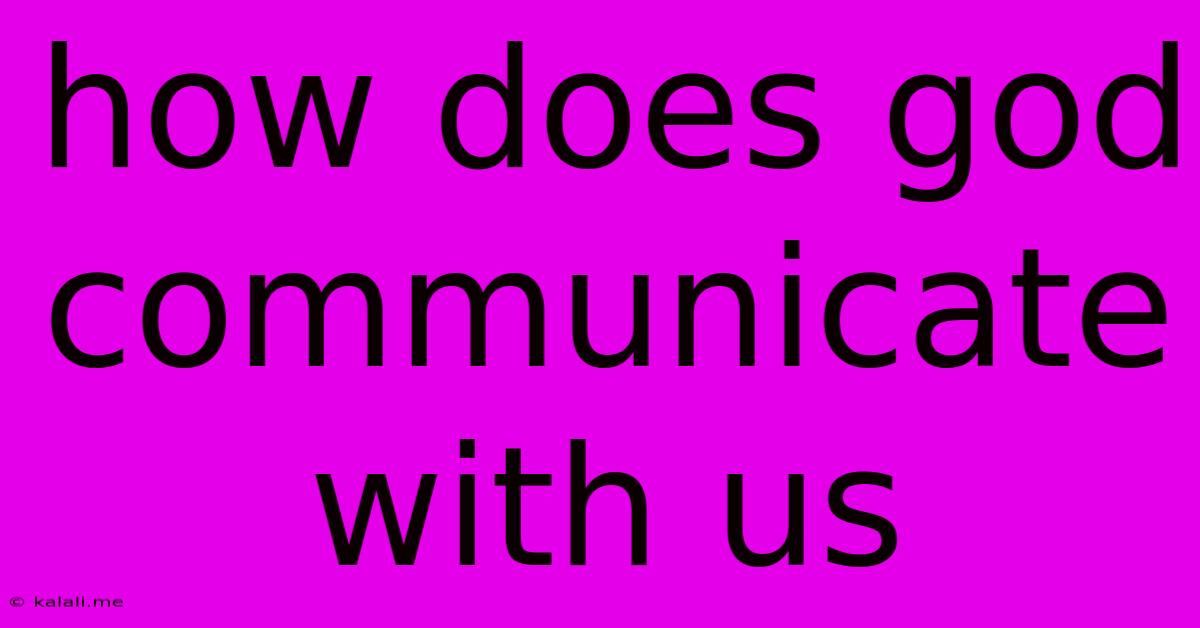How Does God Communicate With Us
Kalali
Jun 02, 2025 · 4 min read

Table of Contents
How Does God Communicate With Us? Exploring Divine Communication
Meta Description: Discover the diverse ways God communicates with humanity, from the whispers of the heart to the grand sweep of history. Explore different perspectives and personal experiences of divine connection.
How does God communicate with us? It's a question pondered by believers across faiths and throughout history. The answer, unsurprisingly, is multifaceted and deeply personal. There's no single, universally accepted method; instead, the experience of divine communication is often described as a tapestry woven from various threads. This article will explore some of the most commonly discussed avenues of divine communication, acknowledging the diverse perspectives and individual experiences within the tapestry.
The Still, Small Voice: Intuition and Inner Guidance
Many believers describe a sense of inner knowing, a quiet intuition or prompting that they perceive as divine guidance. This "still, small voice," as described in the Bible, can manifest as a sudden feeling of clarity, a strong sense of conviction, or a persistent feeling about a particular decision. This internal communication is often subtle, requiring a degree of introspection and attentiveness to discern. Developing this spiritual sensitivity is often seen as a crucial aspect of cultivating a closer relationship with God. This inner guidance is often intertwined with prayer and meditation, providing context and clarity to the messages received.
Scripture and Sacred Texts: A Written Revelation
For many faiths, sacred texts like the Bible, Quran, Torah, or other scriptures serve as a primary channel of divine communication. These texts are viewed as divinely inspired, offering guidance, wisdom, and understanding of God's will and nature. Studying, meditating on, and reflecting upon these scriptures can lead to profound insights and a deeper connection with the divine. Understanding the historical and cultural context of these texts enriches their interpretation, allowing for a more nuanced and meaningful understanding of their messages.
Prayer and Meditation: A Two-Way Dialogue
Prayer and meditation are frequently cited as methods of communicating with God. Prayer, often seen as a conversation with God, allows individuals to express their needs, concerns, and praises. Meditation, on the other hand, can facilitate a state of receptive stillness, opening the heart and mind to receive divine guidance. These practices, often combined, can foster a sense of intimacy and connection with the divine, creating a space for listening as well as speaking. Regular prayer and meditation cultivates a deeper spiritual awareness, increasing the sensitivity to other forms of divine communication.
Nature and Creation: God's Manifest Glory
Many find God's presence revealed in the natural world—the breathtaking beauty of a sunset, the intricate design of a flower, or the vastness of the cosmos. These experiences can evoke a sense of awe, wonder, and reverence, leading to a profound appreciation of God's creative power and majesty. Spending time in nature, engaging in activities like hiking or simply observing the natural world, can be a powerful way to connect with the divine. This connection often fuels a sense of gratitude and peace, reinforcing the belief in a loving and benevolent Creator.
Dreams and Visions: Symbolic Communication
Dreams and visions, often considered symbolic, have been described as avenues of divine communication throughout history. These experiences can be vivid and emotionally charged, conveying messages through imagery, metaphors, and symbolism. Interpreting these messages often requires reflection, prayer, and possibly guidance from trusted spiritual leaders or mentors. While subjective in interpretation, the power and impact of such experiences are undeniable for many.
Community and Fellowship: Shared Spiritual Experiences
The shared spiritual experiences within a faith community can be profoundly enriching. Through fellowship, worship, and collective prayer, individuals can experience a sense of unity and shared connection with God. The support and encouragement of fellow believers can strengthen faith and provide a context for interpreting individual experiences of divine communication. The collective wisdom and shared perspectives within the community can enrich understanding and deepen the connection to the divine.
Conclusion: A Personal Journey
Ultimately, how God communicates with us is a deeply personal journey. While the avenues described above are commonly discussed, the specific ways in which individuals experience divine communication are varied and unique. The key is to cultivate a receptive heart and mind, to actively seek a deeper connection with the divine, and to remain open to the diverse ways God might choose to speak to you. It is a continuous process of growth, learning, and deepening understanding.
Latest Posts
Latest Posts
-
Best Way To Reheat A Chicken Pot Pie
Jun 04, 2025
-
How To Fix Battery Fps Phone
Jun 04, 2025
-
How To Lay Engineered Hardwood Flooring
Jun 04, 2025
-
Is Latex Paint The Same As Acrylic Paint
Jun 04, 2025
-
What Causes A Breaker To Trip
Jun 04, 2025
Related Post
Thank you for visiting our website which covers about How Does God Communicate With Us . We hope the information provided has been useful to you. Feel free to contact us if you have any questions or need further assistance. See you next time and don't miss to bookmark.